Abstract
This paper describes a platform for testing automated argumentation strategies for agents. It is a continuation of the discussion about the Arguing Agents Competition (AAC). The second version of the AAC platform is introduced, including the architecture and the capabilities of the platform, the currently available engine and an automated strategy for the dialogue game.
The argumentation and some of the formalizations for the arguments and dialogues are briefly presented.
Access this chapter
Tax calculation will be finalised at checkout
Purchases are for personal use only
Preview
Unable to display preview. Download preview PDF.
References
Yuan, T., Schulze, J., Devereux, J., Reed, C.: Towards an Arguing Agents Competition: Building on Argumento. In: CMNA (2008)
Wells, S., Łoziński, P., Phan, M.N.: Towards An Arguing Agents Competition: Architectural Considerations. In: CMNA (2008)
Yuan, T., Svansson, V., Moore, D., Grierson, A.: A Computer Game for Abstract Argumentation. In: Proceedings of IJCAI 2007 Workshop on Computational Models of Natural Argument, Hyderabad, India, pp. 62–68 (2007)
Dung, P.M.: On the Acceptability of Arguments and Its Fundamental Role In Nonmonotonic Reasoning, Logic Programming and N-Person Games. Artificial Intelligence 77, 321–357 (1995)
Gordon, T.F., Walton, D.: The Carneades Argumentation Framework. Using Presumptions and Exceptions to Model Critical Questions. In: Proceedings of COMMA 2006, Computational Models of Argument. IOS Press, Amsterdam (2006)
Prakken, H.: Coherence and Flexibility in Dialogue games for Argumentation. Journal of Logic and Computation 15(6) (2005)
Norman, T.J., Carbogim, D.V., Krabbe, E.C.W., Walton, D.: Argument and Multi-Agent Systems. In: Reed, C., Norman, T.J. (eds.) Argumentation Machines. New Frontiers in Argument and Computation. Kluwer Academic Publishers, Dordrecht (2004)
Walton, D.: Argumentation Theory: A Very Short Introduction. In: Rahwan, I., Simari, G.R. (eds.) Argumentation in Artificial Intelligence. Springer, Heidelberg (2009)
Baroni, P., Giacomin, M.: Semantics of Abstract Argument Systems. In: Rahwan, I., Simari, G.R. (eds.) Argumentation in Artificial Intelligence. Springer, Heidelberg (2009)
McBurney, P., Parsons, S.: Dialogue Games for Agent Argumentation. In: Rahwan, I., Simari, G.R. (eds.) Argumentation in Artificial Intelligence. Springer, Heidelberg (2009)
Prakken, H.: Models of Persuasion Dialogue. In: Rahwan, I., Simari, G.R. (eds.) Argumentation in Artificial Intelligence. Springer, Heidelberg (2009)
Dȩbowska, K., Łoziński, P., Reed, C.: Building Bridges Between Everyday Argument and Formal Representation of Reasoning. Studies in Logic, Grammar and Rhetoric 16(29) (2009)
Walton, D.: Informal Logic. A Handbook for Critical Argumentation. Cambridge University Press, Cambridge (2005)
Chesñevar, C., McGinnis, J., Modgil, S., Rahwan, I., Reed, C., Simari, G., South, M., Vreeswijk, G., Willmott, S.: Towards an Argument Interchange Format. The Knowledge Engineering Review, 1–25 (2007)
Dessalles, J.-L.: A Computational Model of Argumentation in Everyday Conversation: A Problem-Centered Approach. In: Besnard, P., Doutre, S., Hunter, A. (eds.) Proceedings of COMMA 2008, Computational Models of Argument. IOS Press, Amsterdam (2008)
Reed, C., Walton, D.: Argumentation schemes in dialogue. In: Hansen, H.V., et al. (eds.) Dissensus and the Search for Common Ground, CD-ROM, pp. 1–11. OSSA, Windsor (2007)
Author information
Authors and Affiliations
Editor information
Editors and Affiliations
Rights and permissions
Copyright information
© 2010 Springer-Verlag Berlin Heidelberg
About this paper
Cite this paper
Kośmicki, P.S. (2010). A Platform for the Evaluation of Automated Argumentation Strategies. In: Szczuka, M., Kryszkiewicz, M., Ramanna, S., Jensen, R., Hu, Q. (eds) Rough Sets and Current Trends in Computing. RSCTC 2010. Lecture Notes in Computer Science(), vol 6086. Springer, Berlin, Heidelberg. https://doi.org/10.1007/978-3-642-13529-3_53
Download citation
DOI: https://doi.org/10.1007/978-3-642-13529-3_53
Publisher Name: Springer, Berlin, Heidelberg
Print ISBN: 978-3-642-13528-6
Online ISBN: 978-3-642-13529-3
eBook Packages: Computer ScienceComputer Science (R0)

